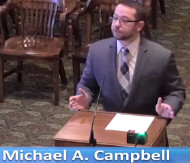10/17/2018
Indiana Supreme Court Considers Speeding Stop By Forgetful CopIndiana Supreme Court weighs whether speeding stop is valid if the police officer does not remember how fast the suspect was going.

Can a police officer stop you for speeding if he does not know how fast you were traveling? That was the question presented Monday to the Indiana Supreme Court, which heard the appeal of Zachariah Marshall, a man pulled over for speeding in a Toyota Camry on October 29, 2016. Marshall was eventually arrested for drunk driving, but the validity of the initial traffic stop came into doubt when Hebron Reserve Officer Sean Dolan showed during testimony that he had no idea how fast Marshall was going.
"The issue in this case is whether an officer can lawfully pull over a motorist for speeding when he can't even so much as provide an estimate of the vehicle's speed, and he's also unsure about the actual speed limit," Marshall's attorney, Michael A. Campbell said on Monday. "How this case is decided today will either breathe new life into the reasonable suspicion standard or put another nail in its coffin as we move toward a police state."
The police officer said that he used a radar gun, but he forgot the reading by the time the case reached the courthouse. The trial judge concluded that the officer made a visual speed estimate from his moving squad car while Marshall was headed in the opposite direction at an intersection. Justices expressed skepticism that the failure to know the speed was relevant.
"He said he didn't write it down because he was giving your guy a break because he knew he was going to be arrested for OWI [operating while under the influence], and he cut him some slack," Justice Geoffrey G. Slaughter said. "Your rule is: No good deed goes unpunished if you try to cut them some slack."
Campbell argued that the reasonable suspicion standard for a traffic stop requires some objectively verifiable proof that the traffic violation actually occurred. The officer's word should not be enough for a speeding violation, he argued, especially since the officer here testified in a deposition that he thought the speed limit was 40 MPH but in subsequent hearing he said it was 50 MPH.
"We don't even has as much as an estimate," Campbell told the justices. "My client had just stopped at the intersection, and my client was accelerating past the intersection. So even if the speed limit was 50 MPH, he was driving a Toyota Camry, he was not driving a Ferrari."
Chief Justice Loretta H. Rush wondered what the harm would be in requiring police officers to write down a number, and a few other colleagues agreed.
"It's about having something objective and verifiable more than just an estimate," Justice Christopher M. Goff added. "Observations can be fallible, especially with margins over a speed limit."


